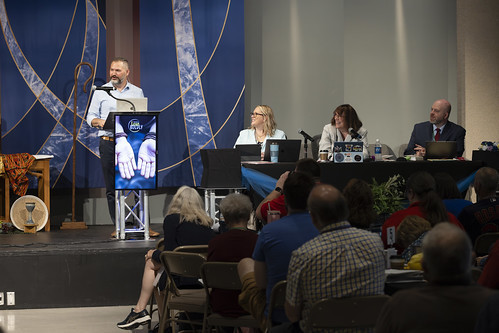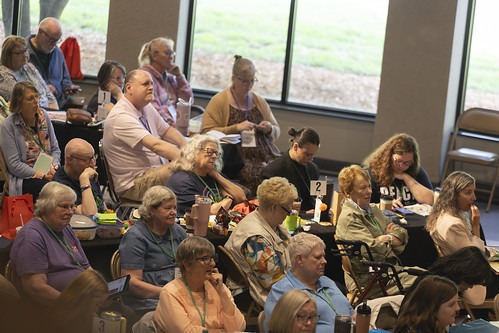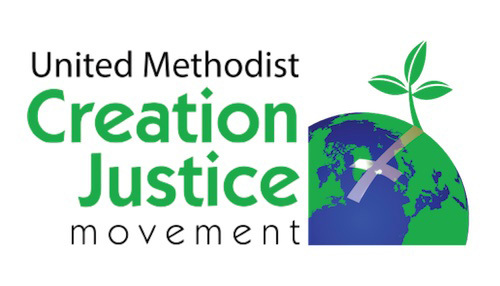
Annual Conference Workshop: God in All Things

Rev. Dr. Tim Eberhart speaking at the 2025 Dakotas Annual Conference. (photos by JLynn studios)
At the 2025 session of the Dakotas Annual Conference, theologian in residence and ordained elder, Rev. Dr. Tim Eberhart shared a Lunch-n-Learn workshop titled God in All Things. During this session he emphasized the importance of staying connected to God’s creation as a form of our spirituality.
“The task of our time, of this generation, is immense. We must repair out human relationship with more than human nature through a deep transition of all of our activities,” said Eberhart.
Francis Weller, in his book The Wild Edge of Sorrow describes five primary gates of grief. One of the gates he explained was Earth grief. Weller imagines Earth grief to be, “the loss of our connection with the natural world.”
Participants were then given time to answer the question, “Where/how are you experiencing Earth grief?” with the people around them.
Some of the responses from participants included; “people tilling up the prairie lands”, “the wildfires in Canada”, “pollution of the ocean”, “roadside trash”, “oil drilling”, “deforestation”, and “single use products”.
“If one can make the case that a land-based, creation-based spirituality can be found within and across the biblical witness, if we can affirm that Jesus himself was a chief practitioner, and if the environmental crises we face are arguably at root spiritual, then why is there seemingly so little concern?” proposed Eberhart.
According to historian Lynn White Jr., in his article The Historic Roots of Our Ecological Crisis, “It was precisely the destruction of earth-based understandings and practices by the dominant forms of Western Christianity which ultimately led to this deep alienation between humans and the natural world.”
Eberhart continued by saying, “This is especially the work that we stewards of a spiritual tradition are uniquely equipped to undertake. You might even say it’s our niche. In the work of our global repair of the planet, spiritual healing is our niche.”
Not only is this an important issue in our society today but, looking back at our roots, we can see examples of John Wesley teaching the importance of creation care and the respect for God’s creation.
“In a later sermon on the education of children, Wesley encourages parents to foster among their chidlren a loving posture towards all creatures. For Wesley, this love ethic toward all is tied to his conviction that God is not distant,” said Eberhart. “God is not separate above the created world, but that God is truly spatially with us in and through all things.”
After sharing a few more examples of Wesley’s deep connection to the natural world, Eberhart discussed the concept of creation-based spirituality in our world today.
“By far the most common spiritual impulse among our young people today is a sense of connection to God or spirit or universe or mystery in and through the natural world. And yet, I think for many Christian leaders there is this fear that something about that impulse is wrong and somehow needs to be corrected,” Eberhart stated.

Clergy and lay leaders gathered at the 2025 Dakotas Annual Conference. (photos by JLynn studios)
Next, the participants were given the prompt, “Where have you experienced God, the Universal Soul, the foundation of all life, the secret force that fills the whole, in the natural world?” to discuss together.
Responses included; “we, humans, are the natural world”, “on motorcycle rides”, “floating on the river”, and “at church camp.”
“Among the many tasks needed today to support the great work, I’m convinced that those of us stewarding religious traditions and communities have the amazing opportunity to help reconnect ourselves and our people to a spirituality rooted in and from the land,” Eberhart added.
Eberhart concluded his session by explaining a few possibilities in order to help either yourself or your local church reconnect with God’s creation.
First, Eberhart says, it is important to foster a deep and intimate spiritual reverence for all life.
“This means extending Jesus’s call to love your neighbor as yourself to all persons, all other humans and more than humans,” explained Eberhart. “So, get to know your neighbors. Learn the names of the plants and the animals and the wildlife, soil types, and rock formations where you live. Find out what they need to flourish.”
Secondly, he asked how can we create new liturgies, rituals, and religious practices that are rooted in the land.
“What if, at least one quarter, we gathered outside to worship at each of our United Methodist communities, joining our hearts and our voices in praise and thanksgiving with the trees and the songbirds?” suggested Eberhart.
Third, we need to return our religious beliefs to the earth.
Eberhart read a quote from Dr. Willie Jennings, associate professor of Theology and African studies at Yale Divinity school, who said, “These days I am trying to understand how to be Christian in the dirt, which means I’m trying to think theologically from dirt and trees, sky and water, ocean and animals– not as background to life, but as the reality of connection that prepares us for the living of life together.”
Finally, we must learn as much as we can about the history of the first people in our region.
“It also means learning about the painful histories of settlement, displacement, violence, and ongoing trauma rooted in colonialism. It means for us to be willing to pass through that doorway of grief, which will require understanding how our own histories are bound up in that ongoing pain,” shared Eberhart.
To learn more about how the United Methodist connection is embracing creation care, visit umcreationjustice.org.

Eberhart also directs the Center for Ecological Regeneration at Garrett-Evangelical Theological Seminary, that offers information and resources to support congregations in their work of creation care.
Learn more about Creation Care in the Dakotas and across our connection on our website.
Click here to view the full Lunch-n-Learn session with Rev. Dr. Eberhart.